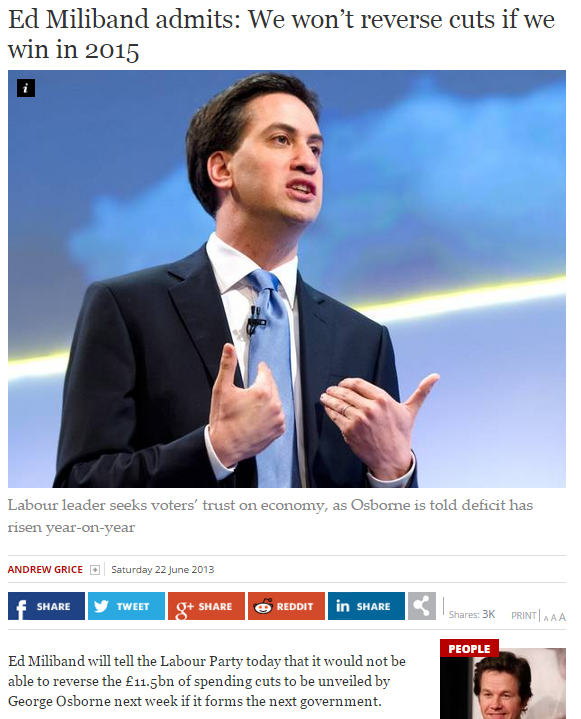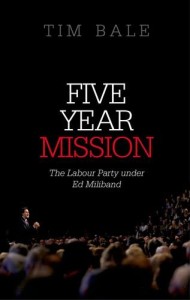Five Year Mission: The Labour Party under Ed Miliband

Labour’s attitude to cuts and economic credibility have continued to dog that party all through Miliband’s leadership, never quite moving on from the past.
Usually an author doesn’t take it well if a book reviewer recommends tearing up their book and scattering the pages around randomly. But I hope Tim Bale, author of Five Year Mission: The Labour Party under Ed Miliband, will forgive me, for this is a reaction to his subject rather than his skill.
 The reason I’ve (metaphorically, not literally, honest Tim) done this with his book is that it brings home just how little sense of progress there has been through Ed Miliband’s time as Labour leader. All the big issues when he became leader – party unity, the deficit, welfare, immigration and Labour’s past – have remained just as big issues now as his first (and possibly last) general election test as leader nears.
The reason I’ve (metaphorically, not literally, honest Tim) done this with his book is that it brings home just how little sense of progress there has been through Ed Miliband’s time as Labour leader. All the big issues when he became leader – party unity, the deficit, welfare, immigration and Labour’s past – have remained just as big issues now as his first (and possibly last) general election test as leader nears.
You can take all the different immigration speeches and controversies that Bale expertly documents, for example, shuffle them around and read about them in a completely different order – and the story still makes as much sense as the real one. Rather than making progress Miliband has been, according to Bale’s book, fighting the same battles again, and again, without any real movement in terms of sorting one issue and then heading on to the next.
If anything, things have moved backward somewhat for in his early days as leader a ‘good’ poll was one that put the party on over 40% and up to 10 points clear; now in early 2015 being in the mid-30s and a couple of points ahead produces a similar chorus of cheery tweets from Labour supporters.Miliband’s experience of going back round over the same ground again and again is not the inevitable fate of a Leader of the Opposition, for it is possible to tackle your legacy, your past and your issues and move on. Tony Blair’s time up to 1997 showed this most clearly, but this isn’t just the flattering distortion of hindsight when looking at a winner. The same true is of twice-defeated Neil Kinnock – perhaps the better parallel as they both took over a party that was well behind and were repeatedly on the receiving end of mocking attacks in the media. (Though it is hard not to laugh at Miliband’s bad luck in having himself – or at least someone looking very much like him – being caught on Google Street View in his constituency office with his head in his hands).
There was, however, a clear sense of progress through Neil Kinnock’s time as leader, even if the final verdict in 1992 was ‘not enough’. With both Kinnock and Blair, the tearing up of a book would produce a bewilderingly confusing narrative. It wouldn’t with Miliband.
Bale tells the story clearly and, despite its familiarity, with interest although as my points above hint at, I would rather have seen a little more context by comparison with Blair and Kinnock.
Given the difficulty of writing up a Leader of the Opposition without even knowing their immediate fate at their first election, Tim Bale does a superb job of making the story interesting and illuminating enough that even after May it will be a book worth reading and referring to.
That is particularly because of the unity lens which Bale uses to make sense of much of what has happened – namely that Ed Miliband’s over-riding objective has been to keep his party together after the bitterness of the Blair / Brown years. Much of what he didn’t do – such as being clearer on what cuts Labour will make or fully supporting political reform – fell foul of this over-riding objective.
The other particular merit of Bale’s analysis is that whilst his views on individual events are often controversial, they are also always views that significant political figures had at the time. So even if you disagree with his judgements at times, he’s still telling you how politics was seen by many – and his judgement is often sharp, as when he concludes of Miliband: “he is at one and the same time arrogant (or at least ‘intellectually self-confident’) and yet chronically prone to indecision – someone who thinks he knows best yet continually consults others, who always listens but never really hears”.
It’s one of those verdicts which if he loses will be damning, yet if he wins will twist round to being a sign of his skill – both to have confidence and to listen. Which verdict it will be, we’ll know in May.
If you like this, you might also be interested in Power Trip: A Decade of Policy, Plots and Spin by Damian McBride and Ed: The Milibands and the making of a Labour leader by Mehdi Hasan and James Macintyre.
Buy Five Year Mission: The Labour Party under Ed Miliband by Tim Bale here.
Note: a review copy of this book was provided to me by the publisher.
Leave a Reply